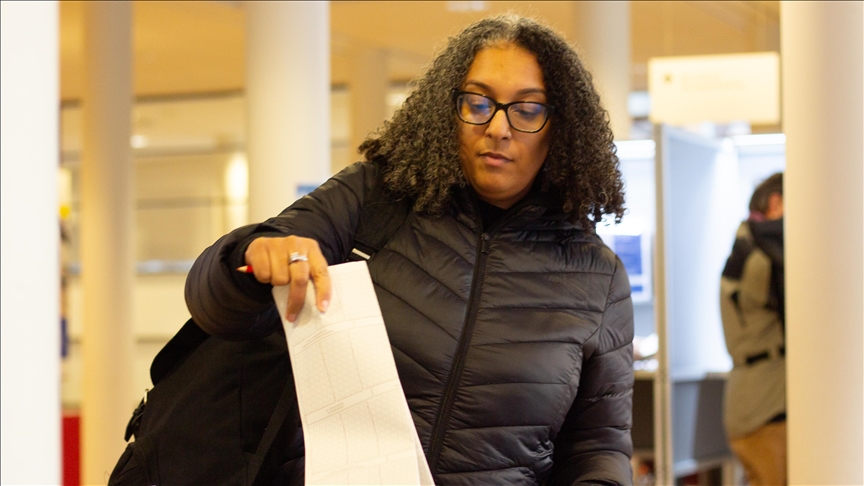EXPLAINER – What to expect from Netherlands’ snap general elections
Vote comes after collapse of Netherlands’ shortest-lived government in modern history

- Migration, housing dominate campaigns as far-right leader Geert Wilders’ PVV leads polls but faces coalition isolation
- Outcome could affect EU migration policy, Europe’s political balance
ATHENS
The Dutch voters will head to the polls on Wednesday to elect 150 members of the House of Representatives, following the collapse of Prime Minister Dick Schoof’s right-wing coalition in June – the country’s shortest-lived government in modern history.
The snap general election, contested by 27 parties and alliances, takes place amid public concerns over migration, housing shortages, and political instability in the Netherlands.
Schoof’s coalition – an uneasy partnership between the far-right Party for Freedom (PVV) and centrist and liberal parties – fell apart after just 11 months over disagreements on asylum policy. The dispute underscored how immigration has become the defining fault line of Dutch politics, mirroring broader trends across Europe.
Migration at the heart of campaign
Polls indicate that immigration remains the top concern for voters and the main driver of support for the far-right.
PVV leader Geert Wilders, who has built his career on hardline anti-Islam and anti-immigration rhetoric, has made migration the centerpiece of his campaign.
In recent months, Wilders attended protests against asylum centers in Helmond and Zwolle, where his inflammatory speeches drew strong criticism from centrist parties, municipalities and minority groups.
In August, Wilders posted a message on American social media company X comparing a young smiling blonde woman labeled “PVV” with a scowling older woman wearing a headscarf labeled “PvdA,” the Labor Party. The post triggered a record number of complaints to the national discrimination hotline and prompted Muslim organizations to file formal charges against him.
His supporters have also been visible at major anti-migrant rallies in Amsterdam, The Hague and other cities, many of which focused on opposing the country’s Muslim population.
Yet the issue extends beyond the far-right.
Major parties including the GroenLinks–Labor alliance, the center-right People’s Party for Freedom and Democracy (VVD), the liberal Democrats 66 (D66), the conservative New Social Contract (NSC) and the populist Farmer–Citizen Movement (BBB) all advocate for stricter regulations on migrants and asylum seekers.
However, they reject Wilders’ proposals to withdraw from international asylum treaties and abolish the right to asylum, framing such steps as extreme and unworkable.
Housing anxieties
A nationwide housing shortage, which many Dutch citizens link to migration, has emerged as the second most important election issue.
All parties agree that the country faces a severe housing crisis, though they differ on how to fix it.
Official data show the Netherlands faces a shortfall of more than 400,000 homes, driven by insufficient construction, demographic changes, a growing number of single-person households and continued migration, among other factors.
The liberal VVD and D66 have proposed easing regulations to accelerate construction and allow more shared housing.
The left-wing GroenLinks–Labor bloc wants to restore state control over parts of the housing market.
Meanwhile, the PVV calls for rent reductions in social housing and priority for Dutch nationals in buying or renting homes.
Fragmented politics, familiar uncertainty
After a decade of successive coalition collapses, the Netherlands faces yet another fragmented election. Polls suggest the far-right PVV is on track to win the most seats once again, but fall short of an outright majority.
The GroenLinks–Labor alliance and VVD are projected to follow, while the Christian Democratic Appeal (CDA) shows signs of a modest revival.
No party is expected to win the 76 seats required for a majority, making a new coalition government all but inevitable.
However, several centrist parties have ruled out joining a coalition with Wilders, citing his record of inflammatory statements and hostility toward migrants and Muslims. That stance raises the likelihood of lengthy coalition talks and potentially another fragile governing alliance.
As a founding member of both the EU and NATO, the Netherlands’ political direction carries weight beyond its borders.
The Dutch economy, one of Europe’s most open and export-oriented, is also closely tied to EU trade and regulatory policy. Analysts warn that extended political uncertainty could dampen investor confidence and delay key decisions on energy transition and fiscal reform.
The outcome could also influence EU migration policy, transatlantic relations and Europe’s stance on Ukraine. A stronger far-right showing would also deepen concerns about the continent’s shifting political balance, with populist and nationalist parties gaining ground from Italy to Germany.
Anadolu Agency website contains only a portion of the news stories offered to subscribers in the AA News Broadcasting System (HAS), and in summarized form. Please contact us for subscription options.

